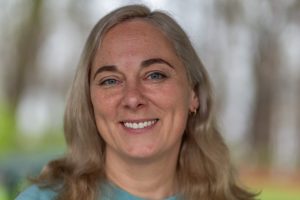
Amee Polk likes to blow things up. So when the self-proclaimed adrenaline junkie discovered she could indulge her passion for thermites and ignition while earning a Doctor of Engineering degree and keeping her job as a chemical engineer for the U.S. Army, she didn’t hesitate.
“Who else will let me blow stuff up and pay me to do it?” said Polk, a U.S. Army Chemical Biological Center (DEVCOM CBC) employee and the first materials science and engineering graduate of Johns Hopkins University’s innovative Doctor of Engineering program.
Designed with the needs of working, mid-career engineering professionals in mind, the Doctor of Engineering (DEng) program allows students to keep their current jobs while being mentored by Whiting School of Engineering faculty as they engage in an advanced research project for their employer. Unlike traditional PhD programs, the DEng program is centered on engineering practice and application.
Polk was encouraged to pursue the DEng degree with Timothy Weihs, a professor of materials science and engineering at the Whiting School.
“I found Tim before applying to the program, through one of the papers he had written on iodine-based work. We had a mutual interest in iodine as a product of thermite reaction. He eventually suggested that I consider the Doctor of Engineering program. I thought it sounded like a great opportunity to grow in both my research life and my job, so I did,” said Polk.
Weihs became Polk’s Hopkins mentor for her DEng project, which focuses on pyrotechnics: materials that produce smoke or other effects without detonation. Their controllable characteristics make them well-suited for firework displays, roadside flares, or for military smoke signaling. As part of the program, she sought to use thermites— a type of pyrotechnic that react with high heat output—to create a material that could combust in confined areas without harming others.
While experimenting with thermites, Polk was surprised to discover one that resisted expansion upon reaction. Most thermite materials expand significantly and produce gas when they react, resulting in the build-up of pressure that could trigger an explosion. She says her work with these thermite formulations can extend to potentially life-or-death situations, such as providing emergency heat in below-freezing temperatures. She describes her work in Combustion and Flame.
While Polk was expanding her research with thermites, she proposed, planned, and executed an independent project with JHU’s Applied Physics Laboratory (APL) using non-expansive thermites to neutralize any material returning from space within the BioVault, a vessel that holds extraterrestrial material arriving on Earth.
“I was thrilled to see this progress and look forward to interacting with Amee on future collaborative efforts,” says Weihs, who hosted Polk in his lab three or four times a month during her Doctor of Engineering program work.
While earning her degree, Polk also helped connect faculty at the Whiting School of Engineering with her home lab, DEVCOM CBC, and supported the creation of the Education Partnership Agreement between them. “We are excited by the opportunity and are exploring multiple ways to interact,” says Weihs.
Polk says that her thermite research for the DEng program benefits her work at DEVCOM CBC, and non-expansive thermites are now used in the Army to maneuver within enclosed spaces.
Before her work with pyrotechnics and thermites, Polk spent most of her career working with chemical warfare agents (CWAs). She says she transitioned her expertise to explosives as peers realized she “is fearless.”
“When I first started at the government, they put me in logistics, and I wasn’t a good fit,” explained Polk. “So I ended up in one of the chemical warfare agent labs for a year. And then somebody realized that I had no fear, and they sent me to the large-scale test facility, which led me to work with explosives.”
Polk says the DEng program helped her pivot from detonating explosive materials to experimenting with pyrotechnics.
“The DEng program has been one of the best career moves I’ve made, as working with Tim allowed me to interact with researchers I never would have met otherwise,” said Polk. “I’ve had the opportunity to participate in programs that were unknown to me before the degree. I’m far more knowledgeable about reactive materials now, and I was exposed to basic research-level analytical methods I didn’t have access to before.”